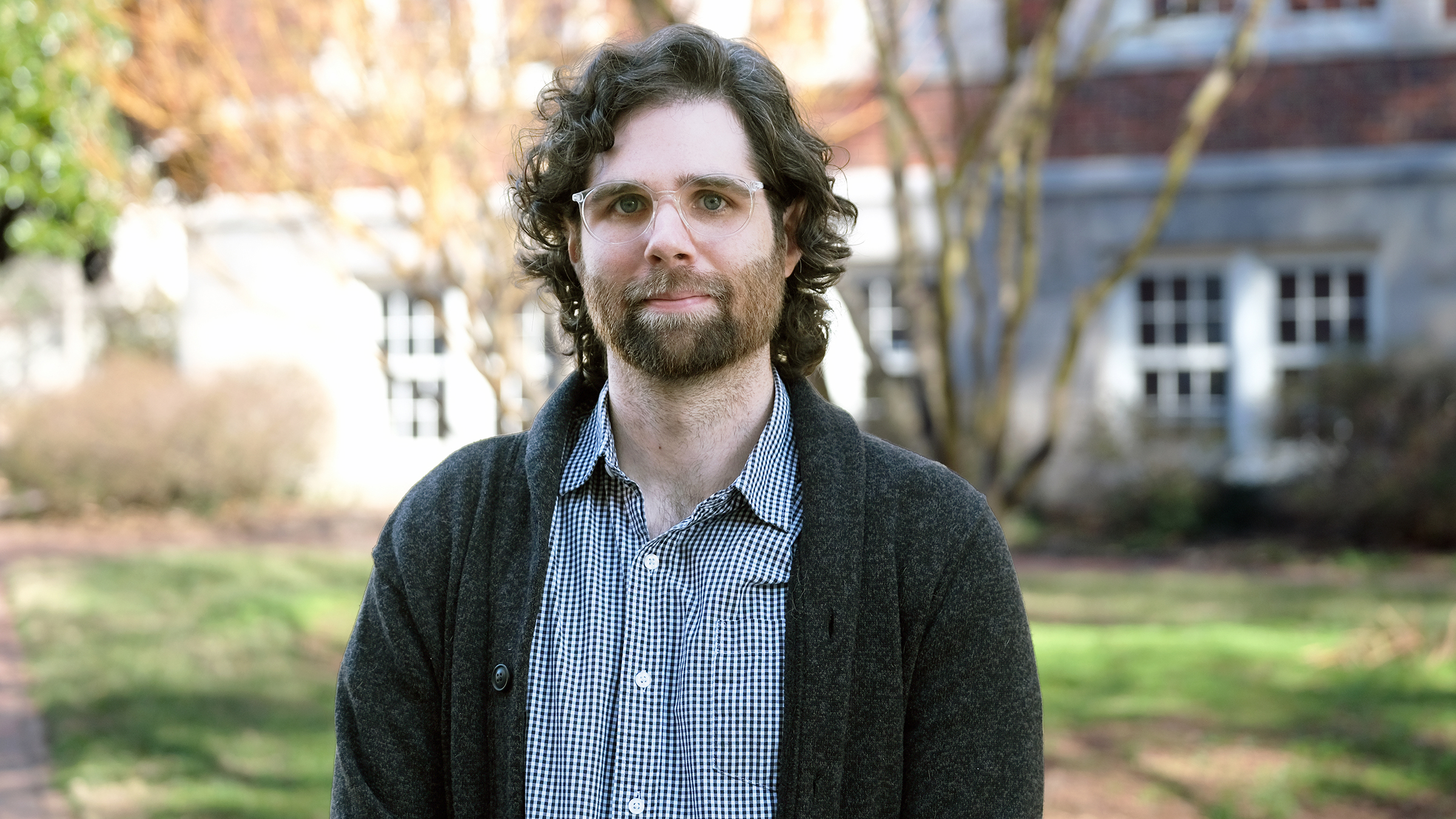As an environmental science and biology teacher at an Atlanta high school, Eric Kirk was energized by developing lessons that connected science concepts to pressing social issues — climate change, matters of public health, and more. He was energized by “the lightbulb moments” his students experienced.
Outside of the classroom, viewing the country around him, Kirk saw strict political divisions drawn around those issues. Once graduated, his students would need to be prepared to join those conversations — and productively move them forward.
“There are all sorts of [societal] questions where you need science to understand them,” said Kirk, now a third-year doctoral student in the UNC School of Education’s Learning Sciences and Psychological Studies concentration. “These are tricky questions. People get passionate because they raise questions of morality and personal freedom, often overlooking the ways solutions that seem ideal from their perspective may have negative consequences for others.
“So how can we prepare students to navigate those questions in ways that account for this complexity and result in responsible, equitable solutions instead of breaking down into Twitter wars?”
Kirk is part of a team — led by Troy Sadler, Ph.D., Thomas James Distinguished Professor of Experiential Learning — working to develop and study issues-based teaching methods and curricula that engage students in science classrooms. Lessons focused on topics pertinent for students — sexually transmitted disease, vaping, fracking, climate change, and, more recently, the COVID-19 pandemic — provide students with scientific knowledge and skills and experiences to become informed, participating members of a democratic society.
Kirk is also one of 15 doctoral students and post-doctoral researchers selected for a highly competitive annual fellowship awarded by the Community for Advancing Discovery Research in Education (CADRE), a resource network for STEM education researchers supported by the National Science Foundation (NSF).
The CADRE Fellows program, now in its 14th year, provides capacity-building and networking opportunities for researchers who are in the early stages of their STEM education careers and whose research interests have a commitment to diversity, equity, inclusion, and justice in preK-12 STEM education.
Making science classrooms engaging for students
As a master’s student majoring in science teaching at the University of Georgia, Kirk collaborated with a fellow graduate student, who had a science teaching background but was majoring in English, to design lesson plans for teaching environmental and ecological concepts through literature.
In Kirk’s classroom, a lesson on Ray Bradbury’s short story “A Sound of Thunder” provided his students an opportunity to explore food webs, energy flow, and ecosystems. Another lesson used Rachel Carson’s “A Fable For Tomorrow” to spark discussion about the consequences our actions can have on the environment.
“The research and development of those lessons was super fun,” he said.
While earning his master’s degree, Kirk worked with science education researchers. He had also met Sadler at a conference and gotten to know his research agenda, which closely aligned with his professional interests. A doctoral degree was inevitable.
Before leaving teaching and enrolling in the School’s doctoral program in fall 2020, Kirk worked with Sadler’s team to develop a pandemic-related curriculum, made possible by a $200,000 National Science Foundation Rapid Response Research program grant.
In addition to learning about the science of viruses and pandemics, students had the opportunity to model associated processes. For example, they could model what virus spread looks like as mask usage goes up or down, what hospital bed availability looks like during virus surge, and how vaccination impacts virus statistics.
Kirk has continued to work on related research with Sadler, most recently collaborating with local after-school programs to teach small groups of middle schoolers using socio-scientific lessons, specifically about COVID-19 which continues to impact people around the world.
Sadler’s research group plans to scale up those lessons for entire middle school science classrooms in nearby school districts.
“Learning with socio-scientific issues helps students understand how science is relevant to the world around them and helps prepare them to confront complex problems and contribute solutions to those problems,” Sadler said. “By engaging in modeling, students learn to use a key scientific practice as a tool for negotiating these complex problems.”
A fellowship for the future
In the year ahead, Kirk and CADRE Fellows will explore career pathways, research dissemination and use, community building and collaboration, and research funding. They will engage in experiences such as peer mentoring and a mock DRK-12 proposal review led by an NSF program director. They will also collaborate with one another on a career-development project.
With the CADRE Fellowship, Kirk hopes to explore and solidify his own line of scholarly inquiry.
“With this fellowship, I want to design a cohesive research agenda,” Kirk said. “So that the work I do for my dissertation sets me up for what I want to do for 10 years down the line.”
Whatever his dissertation and future research focuses on, Kirk says it will undoubtedly focus on socio-scientific issues taught in classrooms and how the scientific knowledge students gain ensures they understand the complex and complicated systems around them.
“As researchers, we have only just begun to understand the potential of socio-scientific issues and the systems they are embedded in as contexts for education,” Sadler said. “Eric’s work which connects his experiences as a classroom teacher with scholarship from the learning sciences, psychology, and philosophy will surely push the field forward.”
“[This approach to science education] gives kids a lot of agency,” Kirk said. “You give them a whiteboard to express what they think and what they know, and then they have a tool to help solve problems in front of them. It’s a really cool and important approach.”
For the full list of the 2023 CADRE Fellows or to learn more about the program, visit cadrek12.org.
